Faculty Job: Myths & Realities – an interview with Kaisa Kajala
About you
Describe your journey from student to newly appointed faculty
Childhood & schooling: countryside in Central Eastern Finland.
Undergrad: Biological Natural Sciences, University of Cambridge, UK (2003-2006). PhD with Julian Hibberd, University of Cambridge, UK (2006-2010).
Two years of travels and short-term science jobs, including short stints with:
Arja Tervahauta, University of Eastern Finland (2010),
Paul Quick & C4 rice team at IRRI, the Philippines (2010),
Ian Small, University of Western Australia (2011), and
Julian Hibberd, University of Cambridge (2011),
as well as short stays in China, Hong Kong, Thailand, Laos, Cambodia, Vietnam and Malaysia to see the world (2010-2012).
Postdoc with Siobhan Brady, UC Davis, USA (2012-2017)
Tenure-track assistant professor position in the Plant Ecophysiology team at Utrecht University in the Netherlands started in 2017.
What inspired you most to pursue your current career?
I always liked plants (thank you mum and dad for the upbringing in the countryside!) and biology somehow just clicked with me when I was about 14. I was nerdy and liked logic, puzzles, games and STEM subjects. During high school I pursued all avenues to learn more about genetics and gene expression. First year of undergrad I first started to realize how ridiculously awesome the phenotypic plasticity of plants was. Later on, I started fixating on the question “how do individual cell types know what cell type they are?” Maybe little foolishly, maybe blinded by my optimism, I never considered any other career plans but the academic track, and so far, it has worked out.
What is the major focus of you research team?
At the moment I have a few pretty diverse projects going on in addition to still wrapping up my postdoc work. In brief, my team works on how individual cell types respond to environmental cues. These include:
Tomato root exodermis suberization in response to drought
Arabidopsis leaf upward leaf movement in response to touch
Tomato cell types in response to neighbour detection (low red:far red).
Which conferences do you regularly attend?
Next ones coming up on my list are the Plant Apoplastic Diffusion Barrier meeting in Bonn (Aug 28-30 2019) and the GRC in Salt and Water Stress in Switzerland (May 2020). Other conferences I like to attend include the Root Development meeting, ICAR, Solgenomics, and I’ve always wanted to attend the FASEB Plant Developmental Biology meeting.
About your job hunt
How long did it take you from the beginning of searching faculty jobs to get one?
I submitted half a dozen applications during 2015 – at this point I knew I had at least a year, maybe two, of postdoc funding left. None of my applications were shortlisted and as these were European institutes, I received quickly a polite “no” for each position I applied for. At the end of 2015, one of my collaborators forwarded my CV to the Plant Ecophysiology team at UU as they were looking to recruit someone with my expertise. This led to a couple of skype calls and an interview visit in February 2016, followed by a job offer very soon after. As the process was very unusual to me (I never submitted an application package) and as I suffered from imposter syndrome, I had hard time believing that I had actually landed a job.
During your job hunt, what did you learn about yourself or about the process of finding an academic job?
When I interviewed at UU, I met with not only the professors at the Institute of Environmental Biology, but also with every PhD student and postdoc of the Plant Ecophysiology team. During these meetings, I realized that I had grown to the point where I found it very natural to assume the collaborative role in the discussions with the professors, and a mentoring role in the discussions with the early career researchers. It was the first time that I realized that maybe I actually am ready for the next step!
Based on your experiences and the feedback you got during the job search, what do you think are key skills and accomplishments that a successful candidate must demonstrate?
I think that the one aspect that gets often forgotten is that most search committees are after all recruiting a colleague; a someone who they will work with for decades to come. Enthusiasm and social fluency can be valuable skills!
I think that the one aspect that gets often forgotten is that most search committees are after all recruiting a colleague; a someone who they will work with for decades to come.
Which published paper was the most influential for your career or getting the faculty job?
Very interesting premise – that everyone has that one big publication that really makes their career and lands them a job. I was lucky to be recruited without my big postdoc papers being out yet, while the publication record from my PhD period is solid. My most exciting work to date (in my opinion), the cell type atlas of tomato root translatome and chromosome accessibility, is still in the pipeline but getting closer to submission every day!
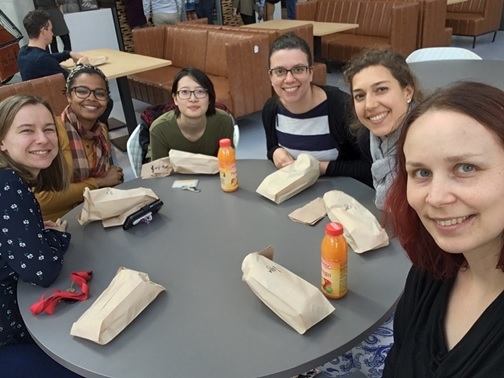
Team lunch – April 2019. From left to right: Sarah Courbier (primary mentor: Ronald Pierik), Dr Mariana Silva Artur, Linge Li, Dr Chrysa Pantazopoulou, Martina Huber (primary mentor: Ronald Pierik), Kaisa Kajala.
Advice for job applicants
Beyond your research and publications, how did you prepare for the academic job hunt during your postdoc?
I think I was continuously preparing to some extent – I was doing a lot of additional tasks that I enjoyed but also made me a more well-rounded applicant: for example I organized postdoc seminars and a symposium, I obtained teaching experience and training, and I mentored undergraduate research interns. I started drafting a research plan in 2014 I think, and my first applications were in early 2015. It was important to start writing out your ideas and plans out well ahead of time, so that you could refine them and also obtain the crucial pieces of preliminary data as needed.
How did you prepare for the actual job hunt? How did you identify potential opportunities, prepare your application materials, and prepare for interviews?
A lot of open jobs are advertised on Twitter. I think I saw every position I applied for there. I also tend to keep an eye out for friends/colleagues who are looking for positions and other opportunities, so I frequently forward tweets to people who I think should know about those opportunities.
My interview prep involved mainly getting my seminar (research talk) nailed. It was the hardest I’ve ever worked on for getting a talk ready; I practiced with a lot of tough people who I look up to, and I remember crying from frustration because I felt that I couldn’t make it work. After all the practice and polishing, I practiced it for another dozen times. In the end, the talk went fine.
The two days leading to my interview I spent with my parents in Amsterdam – I hadn’t seen them in a year, and they wanted to catch up because I was in Europe. It relaxed me and got me over the jetlag (thanks mum and dad!)
About you as a faculty member
What were the initial challenges to starting your own lab?
The Dutch system is stellar for many aspects of starting your own lab: assistant professors are a part of a bigger team, so I joined a team of three other staff members and a fully running and equipped lab. My teaching and service loads are reasonable (compared to many other positions/countries). The downside of this system is that there is no start-up package. It took me year to find the funding and to recruit the first members of my team, and I’m still hoping to find more funding to really establish my own research lines.
What qualities do you look for when recruiting for your lab?
I haven’t yet recruited that many team members, and I think this fully depends on the position. Previously when recruiting undergraduate research interns, my only requirements were that the student was interested and invested in the topic, and that the communication between us was flowing well. For my team, I want to cultivate an atmosphere of collaboration, conversation and pushing each other to reach higher. One day I would like to see a team with a diverse, complementary skillset.
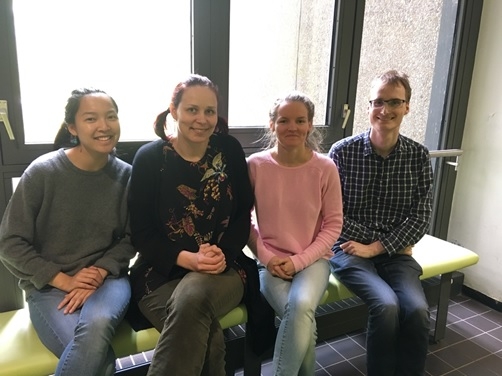
First group of students finishing in the lab – June 2018. From left to right: Prao Chittapraneerat (BSc), Kaisa Kajala, Alise Žvigule (MSc), Daan Morren (HBO/technician)
How do you manage “work-life balance” as a faculty?
I realized very early on – during my undergraduate studies – that I cannot work ridiculous hours and that I need my recharging time. Since then, I have aimed to work efficiently 8-9h per day during the work week, and not to schedule any work for the evenings and weekends. Of course, there are deadlines, rush times, big experiments and moments when you just feel like working on your day off. And I’m a sucker for replying to my emails whenever I receive them. Recently I became a parent and I elected to work a four-day week. Surprisingly, I have discovered that I can be even more efficient than I used to be!
My mental health hobby is what I call “knitflix” – I love knitting and crocheting, and binge-watching tv shows. Knitting gives my hands and brain that extra something to do that allows my brain to switch off and unwind while watching tv. Embarrassingly, this used to be my number one Friday night entertainment!
Whom do you like to thank for supporting and inspiring you along this journey?
Two of the biggest contributors to my successes have been my extremely supportive partner who’s empowered me around the world and back, and my extremely supportive scientific network. I would like to especially mention my postdoc mentor Siobhan Brady (UC Davis), the collaborators on my postdoc project: Julia Bailey-Serres (UC Riverside), Neelima Sinha (UC Davis) and Roger Deal (Emory), and my mentors at my tenure-track institute: Ronald Pierik, Rashmi Sasidharan and Rens Voesenek (Utrecht University). It is invaluable to have a team that has your back and provides you with mentorship and support to aim higher.
My biggest inspiration has been Siobhan Brady and her ability to carry out complex research on a wide range of topics with the biggest smile on her face every day. I would love to be such a positive influence to others one day!
If prospective students and postdocs want to reach you, where can they contact you and read about your work?
Email: [email protected]
Twitter: https://twitter.com/kaisakajala
Department Website: https://www.uu.nl/en/research/plant-ecophysiology
Lab website: https://www.uu.nl/staff/KKajal


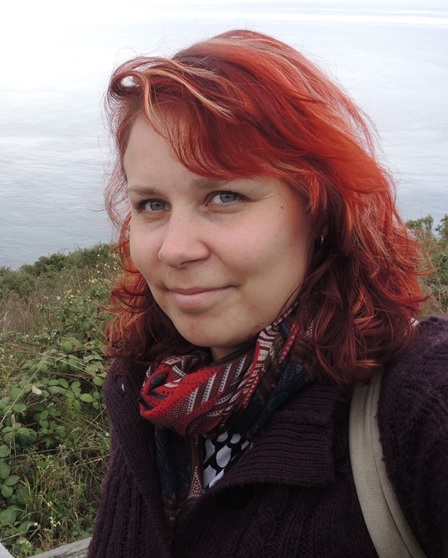
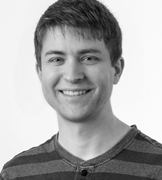
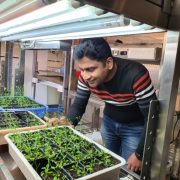
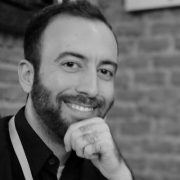
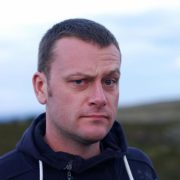
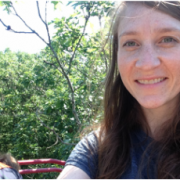
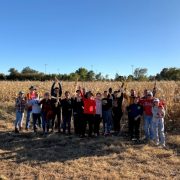
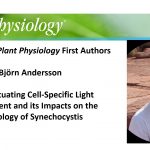
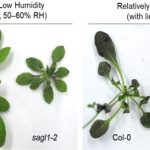
Leave a Reply
Want to join the discussion?Feel free to contribute!